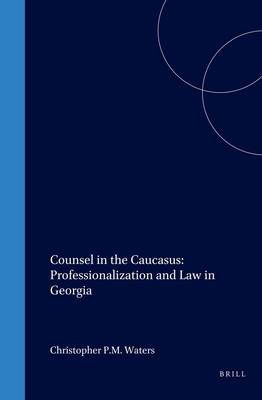
- Afhalen na 1 uur in een winkel met voorraad
- Gratis thuislevering in België vanaf € 30
- Ruim aanbod met 7 miljoen producten
- Afhalen na 1 uur in een winkel met voorraad
- Gratis thuislevering in België vanaf € 30
- Ruim aanbod met 7 miljoen producten
Zoeken
Counsel in the Caucasus: Professionalization and Law in Georgia
Christopher P M Waters
€ 83,95
+ 167 punten
Omschrijving
Winner of the Hart/Socio-Legal Studies Association Book Prize for Early Career Academics, 2005.
This book traces the development of the rule of law in Georgia since its independence and speculates on its future direction. It does so by focusing on changes in the legal profession after 1991. Intriguingly, the book, which is based on extensive field-work, concludes that culture and informal regulation are key to understanding how Georgian lawyers are governed, or rather govern themselves. Indeed, for several years after independence from the Soviet Union there was no functioning law on attorneys; informal regulation, based on the importance of reputation and networks, was the only sort of regulation. Other topics addressed in the book include Georgia's legal history, its current human rights situation, theories of professionalization, and the link between law and development. The book also compares the Georgian experience to that country's South Caucasian neighbors - Armenia and Azerbaijan - thus rounding the book out as a regional study.
This book traces the development of the rule of law in Georgia since its independence and speculates on its future direction. It does so by focusing on changes in the legal profession after 1991. Intriguingly, the book, which is based on extensive field-work, concludes that culture and informal regulation are key to understanding how Georgian lawyers are governed, or rather govern themselves. Indeed, for several years after independence from the Soviet Union there was no functioning law on attorneys; informal regulation, based on the importance of reputation and networks, was the only sort of regulation. Other topics addressed in the book include Georgia's legal history, its current human rights situation, theories of professionalization, and the link between law and development. The book also compares the Georgian experience to that country's South Caucasian neighbors - Armenia and Azerbaijan - thus rounding the book out as a regional study.
Specificaties
Betrokkenen
- Auteur(s):
- Uitgeverij:
Inhoud
- Aantal bladzijden:
- 191
- Taal:
- Engels
- Reeks:
- Reeksnummer:
- nr. 54
Eigenschappen
- Productcode (EAN):
- 9789004139473
- Verschijningsdatum:
- 1/01/2004
- Uitvoering:
- Paperback
- Formaat:
- Trade paperback (VS)
- Afmetingen:
- 165 mm x 243 mm
- Gewicht:
- 517 g

Alleen bij Standaard Boekhandel
+ 167 punten op je klantenkaart van Standaard Boekhandel
Beoordelingen
We publiceren alleen reviews die voldoen aan de voorwaarden voor reviews. Bekijk onze voorwaarden voor reviews.








